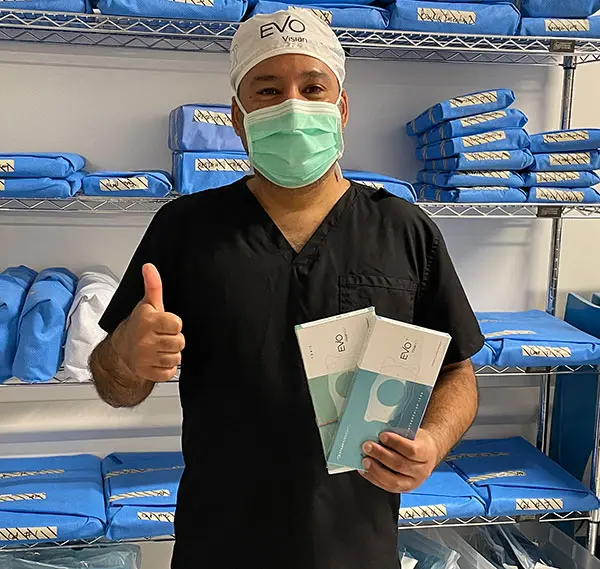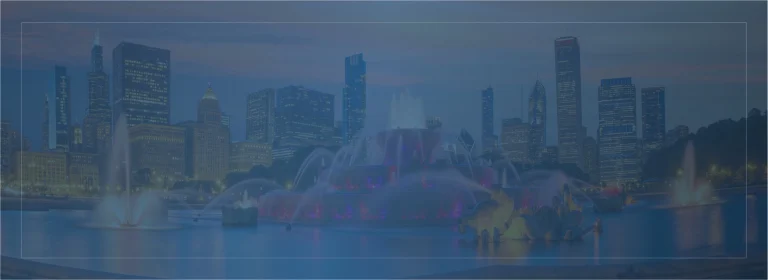Vision Correction Options
Your Vision is Our Focus!
At Kovach Eye Institute, our mission is to provide each of our patients from Chicago and Chicagoland areas with extraordinary vision. We realize that each patient’s eyes, lifestyle, and vision goals are unique. This is why we provide a full range of vision correction options so that each of our patients can achieve visual freedom in the manner that works best for them.


At Kovach Eye we believe in vision without limits.
Are you a candidate for vision correction surgery? Take our LASIK self-test to see if it’s a good fit!
What Can Vision Correction Surgery Treat?
The experienced eye surgeons at Kovach Eye Institute perform vision correction surgery to address all common vision problems, known as refractive errors.
To produce the images we see, light that is passed through the cornea is focused through the eye’s lens onto the retina. If the cornea is not properly shaped or curved, this leads to vision problems such as:
- Nearsightedness (myopia): Nearsightedness (blurry distance vision) is a result of a cornea that is longer or more curved than normal.
- Farsightedness (hyperopia): Farsightedness (blurry near vision) is caused by cornea that is shorter or less curved than normal.
- Astigmatism: Astigmatism is caused by a cornea that is irregular in shape (we often explain this as a cornea that is shaped like a football rather than a basketball). This can affect vision at all ranges.
LASIK Surgery
When patients consider surgery to improve their vision, LASIK is often the first procedure that comes to mind. LASIK (laser-assisted in situ keratomileusis) is a laser vision correction procedure that involves reshaping the cornea to improve the way light is focused onto the retina. LASIK is fast and comfortable, and offers a short recovery period and near-immediate results.
Learn More About LASIK

SMILE LASIK
SMILE, or Small Incision Lenticule Extraction, is an advanced vision correction procedure that is similar to LASIK. However, SMILE is Not Your Parents’ LASIK thanks to vast improvements in vision correction technology since LASIK was first performed 30 years ago. For patients who are candidates, SMILE offers a number of added benefits when compared to LASIK, including a less invasive procedure with a smaller incision and fewer potential side effects, a shorter recovery, and for some, better results. SMILE is an excellent treatment for qualified patients who have nearsightedness with or without astigmatism.
EVO ICL
EVO ICL (Implantable Collamer™ Lens) and Toric ICL for astigmatism provide enhaced vision compared to most other forms of vision correction. The ICL allows these excellent results without altering the shape of the cornea. While traditional contact lenses fit on the surface of the eye, ICL are surgically placed within the eye. They are positioned between the iris (which is the colored part of the eye) and the eye’s natural lens. These lenses are intended to permanently correct vision, but they can be replaced if eyes subsequently change.

PRK
PRK (photorefractive keratectomy) is similar to LASIK in that the eye surgeon reshapes the cornea to improve a patient’s vision during this laser vision correction procedure. However, the approach is different with PRK: rather than creating a corneal flap, the outer layer of the cornea (epithelium) is removed. Because of this, some patients who are not good candidates for LASIK because they have irregular or thin corneas can still achieve comparable vision correction results.
Presbyopia Treatment
With age, the lenses of our eyes become harder and less flexible, making it more difficult to see up close. These age-related changes happen to everyone beginning in their 40s, and can lead to blurry near vision, also known as presbyopia. While some of our patients choose to improve age-related near vision loss by wearing bifocals or reading glasses, others seek a more long-term or permanent solution.
Refractive Lens Exchange
Refractive Lens Exchange is nearly identical to cataract surgery. This elective surgery is performed prior to a cataract forming. During this procedure, your eye’s natural lens is replaced with an artificial intraocular lens (IOL). We offer a full range of advanced IOL options, allowing our eye surgeons to customize each patient’s vision correction for their specific needs, including near, intermediate, and distance and everywhere in between. One of the best parts about refractive lens exchange is that because the natural lens of the eye is replaced during this procedure, patients will never develop cataracts.
VUITY™ Eye Drops for Presbyopia
VUITY Eye Drops is the first FDA-approved prescription eye drop to treat age-related blurry near vision (presbyopia) in adults. VUITY drops constrict the size of the pupil for up to six hours, improving a person’s ability to focus up-close. It is important to have a full comprehensive eye exam prior to starting these drops.
Frequently Asked Questions About Vision Correction Surgery
Vision correction surgery is considered to be elective (not medically necessary), which means that it is not eligible for coverage under our patients’ insurance plans.
We believe each of our patients is entitled to extraordinary vision, regardless of their budget. To that end, we offer a number of payment and financing options designed to bring the goal of enhanced vision within reach.
Most vision correction procedures involve permanent changes to the eye, which results in lasting results that help reduce or eliminate your need for corrective eyewear. However, these procedures can’t stop the eye’s natural aging process, which means that patients will still encounter age-related vision changes, or presbyopia. If your vision changes after surgery, we can recommend the best treatment plan for you.

How Do I Know Which Option is Best for Me?
The best way to know which vision correction procedure is best for you is to attend a consultation with one of the experts at Kovach Eye Institute, which you can schedule today by contacting us. In the meantime, you can take our Vision Correction Candidacy Quiz to learn more about your options for vision correction in the Chicago and Chicagoland areas.
The doctors at Kovach Eye Institute have either authored or reviewed and approved this content.
Page Updated:

